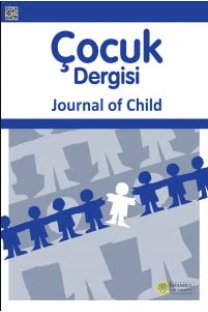Çocuk Sağlığı ve Kafein
Child Health and Caffeine
___
- Aksoy M. Ansiklopedik Beslenme, Diyet ve Gıda Sözlüğü. Hatipoğlu Yayınları, Ankara, 2007: 300-1.
- International Food Information Council Foundation Caffeine & Health: Clarifying The Controversies. Washington DC. March 2008.
- Barone JJ, Roberst H. Caffeine consumption. Food Chem Toxicol 1996; 34:119-29.
- Neglih A. Are we dependent upon coffee and caffeine? A review on human and animal data. Neurosci Biobehav Rev 1999; 23:563-76.
- Harland BF. Caffeine and nutrition. Nutrition 2000; 16(7-8): 522-6.
- Fredholm BB, Battig K, Holmen J, Nehlig A, Zvartau EE. Actions of caffeine in the brain with special reference to fac- tors that contribute to its widespread use. Pharmacol Rev 1999; 51(1):83-133.
- Frary CD, Johnson RK, Wang MQ. Food sources and inta- kes of caffeine in the diets of persons in the United States. J Am Diet Assoc 2005; 105(1):110-3.
- Kendrick SF, Day CP. A coffee with your brandy, sir? J Hepatol 2007; 46:980-2.
- Rakıcıoğlu N. Ratlarda diyete eklenen kahve ve kafeinin serum liptlerine etkisi. Hacettepe Üniversitesi, Sağlık Bilimleri Enstitüsü, Beslenme ve Diyetetik Programı, Doktora Tezi, Ankara, 1993.
- Roehrs T, Roth T. Caffeine: Sleep and daytime sleepiness. Sleep Med Rev 2008; 12:153-62.
- Bolinano D, Cappolino G, Barilla A, et al. Caffeine and the Kidney: What evidence right now? J Ren Nutr 2007; 17:225- 34.
- Donovan JL, DeVane CL. A primer on caffeine pharmaco- logy and ıts drug ınteractions in clincal psychopharmacology. Psychopharmacol Bull 2001; 35(3):30-40.
- Lieberman HR. Nutrition, brain function and cognitive per- formance. Military Nutrition Division. USARIEM. Appetite 2003; 40:245-54.
- Van Boxtel MP, Schmit JA, Bosma H. Jolles J. Effect of habitual caffeine use on cognitive change: A longitudinal perspective. Pharmacol Biochem Beha 2003; 75:921-7.
- Costa MS, Bottton PH, Mioranzza S, Souza DO, Porciuncula LO. Caffeine prevents age-associated recogniti- on memory decline and changes brain-derived neurotrophic factor and tırosine kinase receptor (Trkb) content in mice. Neuroscience 2008; 153:1071-8.
- Shilo L, Sabbah H, Hadari R, et al. The effects of coffee consumption on sleep and melatonin secretion. Sleep Med 2002; 3:271-3.
- Tofler OB, Foy S, Ng K, Hickey G, Burke V. Coffee and coronary heart disease. Heart Lung Circ 2001; 10:116-20.
- Nawrot P, Jordan S, Eastwood J, Rotstein J, Hugenholtz A, Feeley M. Effect of caffeine on human health. Food Addit Contam 2003; 20(1):1-30.
- ADA Report. Position of the American Dietetic Association: Nutrition and lifestyle for a healthy pregnancy outcome J Am Diet Assoc 2008; 108:553-61.
- Leviton A, Covan LA. Caffeine consumption by women to their risk of reproductive hazards. Food Chem Toxicol 2002; 40(9):1271-310.
- Christian MS, Brent RL. Teratogen update: Evaluation of the reproductive and developmental risks of caffeine. Teratology 2001; 64(1):51-78.
- Weng X, Odouli R, Li D. Maternal caffeine consumption during pregnancy and the risk of miscarriage: A prospective cohort study. Am J Obstet Gynecol 2008; 198:279.
- Tucker KL. Dietary intake and bone status with aging. Curr Pharm Des 2003; 9(32):2687-704.
- Rico H, Canal ML, Manas R, Lavado JM, Costa C, Pedrera JD. Effect of caffeine, vitamin D, and other nutrients on quantitative phalangeal bone ultrasound in postmenopausal women. Nutrition 2002; 18:189-93.
- Bernstein GA, Carroll ME, Thuras PD, Cosgrove KP, Roth ME. Caffeine dpendence in teenagers. Drug and alcohol dependence. Drug Alcohol Depend 2002; 66:1-6.
- MacKenzie T, Comi R, Sluss P, et al. Metabolic and hormo- nal effects of caffeine: Randomized, double-blind, Placebo- controlled crossover trail. Metabolism 2007; 56:1694-8.
- Van Dam RM. Coffee and type 2 diabetes: From beans to beta-cells. Nutr Metab Cardiovas Dis 2006; 16:69-77.
- Ilich JZ, Kerstetter JE. Nutrition in bone health revisited: A story beyond calcium. J Am Coll Nutr 2000; 19(6):715-37.
- Kalda A, Yu L, Oztas E, Chen J. Novel neuroprotection by caffeine and adenosine A2A receptor antagonists in animal models of parkinson’s disease. J Neurol Sc 2006; 248:9-15.
- La Vecchia C. Coffee, liver enzymes, cisshosis and liver cancer, J Hepatol 2005; 42:444-6.
- Marcason W. Is caffeine considered a diüretic and should my client increase their fluid intake to compensate for this effect? J Am Diet Assoc 2008; 108:908.
- Drewnowski A, Bellisle F. Is sweetness addictive? British Nutrition Foundation Nutrition Bulletin 2007; 32(suppl 1):52- 60.
- Higdon JV, Freid B. Coffee and health: A Review of recent human research. Crit Rev Food Sci Nutr 2006; 46(2):101-23.
- Knight CA, Knight I, Mitchell DC, Zepp JE. Beverage caffeine intake in US consumers and subpopulations of inte- rest: Estimates from the share of intake panel survey. Food Chem. Toxicol 2004; 42(12):1923-30.
- International Coffee Organization, Roasting/Making coffee. http://www.ico.org/making_coffee.asp.
- ISSN: 1302-9940
- Yayın Aralığı: Yılda 4 Sayı
- Başlangıç: 2000
- Yayıncı: İstanbul Üniversitesi
Muazzez GARİPAĞAOĞLU, Nuray KUYRUKÇU
Smith-Lemli-Opitz Sendromu SLOS : Prenatal ve Postnatal Dönemde Tanısı
Ayça DİLRUBA ASLANGER, R Özgür ROSTİ, Hülya KAYSERİLİ
Yatarak İzlenen Rotavirüs Vakalarımızın Epidemiyolojik Özellikleri ve Nozokomiyal İnfeksiyon
Olcay YASA, Müferret ERGÜVEN, Sinem KARACA ATAKAN, Nilüfer ÇETİNER, Tevfik MISIRLI, Ali AKKOÇ
Transfüzyon Gerektiren Hemoperikardiyum ve Kalp Tamponadı
Yakup ERGÜL, Kemal NİŞLİ, Aygün DİNDAR, Ümrah AYDOĞAN, Rukiye Eker ÖMEROĞLU, Türkan ERTUĞRUL
Altı-On İki Yaş Grubu Çocukların Diş Sağlığını Etkileyen Anneye Ait Faktörlerin Araştırılması
Necmi NAMAL, Hayriye ERTEMVEHİD, Suphi VEHİD, Günay CAN
Primer Raynaud Sendromunda Akut Vasküler Komplikasyonlar ve Tedavi
Yakup ERGÜL, Kemal NİŞLİ, Aygün DİNDAR, Ümrah AYDOĞAN, Rukiye Eker ÖMEROĞLU, Türkan ERTUĞRUL
Dilek DİLLİ, Şerife S OĞUZ, Hülya ÖZKAN ULU, Uğur DİLMEN
Lamotrijin İlişkili Dress Sendromu: Bir Vaka Sunumu
Ebru ARIK YILMAZ, Serap ÖZMEN, Nilden TUYGUN, Tayfun GİNİŞ, Gönül TANIR
Hipokrom Mikrositer Anemide Demir Eksikliği Anemisi ve Talasemi Taşıyıcılığı Oranları
Fatma OĞUZ, Tuğçe Aksu UZUNHAN, Fatih Köksal BİNNETOĞLU, Hayriye ERTEM VEHİD
